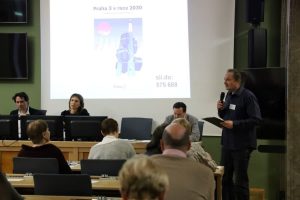Coordinators of Participatory Planning is a program that aims to enshrine participation in district offices as a standard approach. We cooperate on the program together with the Prague Institute of Planning and Development since 2020. Karel Světlík is one of 10 participation coordinators from 12 city districts that have participated in the city-wide pilot program. As the two-year pilot draws to a close, we asked Karel a few questions about his experience and impressions of the established role.

Why do you think it is important to have a coordinator of participatory planning in a city district? What value does it bring to the city?
Basically, it is the matter of starting planning from the outset with the citizens and representatives of the organizations concerned. The value is time and money savings. A side effect is greater people’s confidence in government and democracy as such. A trained coordinator knows how to achieve this.
What makes a great coordinator? Can you name his/her top 3 qualities?
The most important thing is communication. People like to get the word out, but the first thing that they overwhelm you with is the accumulated frustration. You have to be able to understand them and cope with it. But it is also the communication on the inside, the ability to persuade other officials to gain the support of politicians. Then organizational skills are necessary to get even a complex thing done well and on time. And third, it is the ability to understand the logic of how the office works. A pretentious revolutionary will soon fare very badly.
What are the next steps for your particular role to take and how do you plan to achieve them?
In addition to the usual participatory planning of investment projects (reconstruction of parks, squares, etc.), we plan to strengthen the communication of some departments with the public and interest organizations. The first will be a meeting on the environment in Prague 3. We are also preparing a handle for the use of public space to support cultural and leisure activities arising from below. We would also like to pilot citizens’ assemblies in the future.
What was the biggest challenge that you had to face during the programme?
A coordinator’s biggest challenge is to ensure that his or her agenda is respected and organically integrated into the office’s functioning. The results do not come right away and the fog of absurd-sounding anglicisms associated with participation arouses distrust. A coordinator should first have a good understanding of how the office works and on specific examples be able to explain the benefits of his or her work.
How do you see your role of coordinator of participatory planning now vs when in the beginning?
I expected the coordinators to be a bigger link between the municipality and the city district. Cooperation with IPR works well, but as far as the City of Prague is concerned, I expected greater connections.
What piece of advice would you give to a newbie at your position?
It is essential that the person has strong political support. They must have the trust of key councilors and, of course, key department leaders. Then it is the effort, the effect of which is multiplied by unity. People care about it and understand it.
What is your biggest accomplishment regarding the programme that you are proud of?
The biggest achievement is the strategic plan, not in the sense that it’s done, but it was the first strategic plan that came out of the shadow of an uninteresting document that the public had no say in. We managed to turn a formal document into a public thing. People are interested and coming to te meetings and that’s satisfying.
Do you want to learn more about the program? Are you interested in implementing participatory planning into your agenda? Reach out to us via info@participationfactory.com